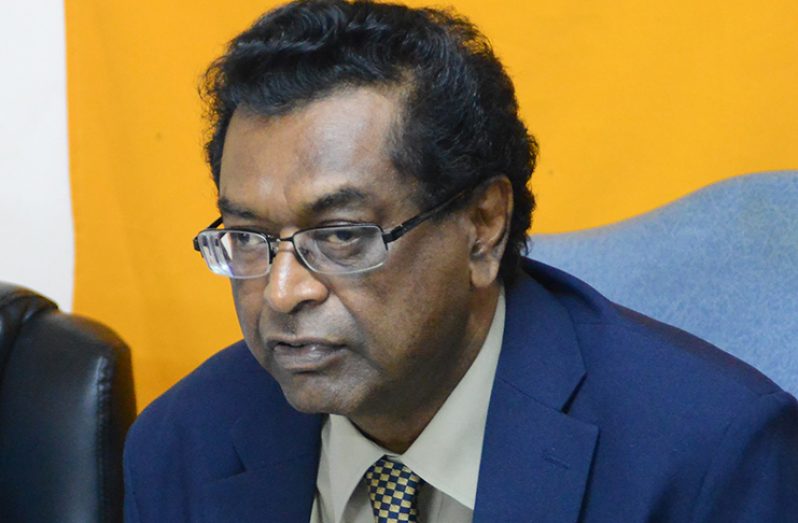…Min. Ramjattan urges cops in their role in treating with domestic violence
…as 32 police ranks receive DV Scenario Response Training
ONE hundred and thirty-two police officers from seven divisions across the country are now better equipped to respond to domestic violence cases now that they have completed a Domestic Violence Scenario Response Training.
The training was facilitated by Consultant Novelette Grant under the Citizen Security Strengthening Programme, primarily to equip mid-career police officers with the requisite skills to carry out their duties with the highest level of professionalism, empathy and integrity when addressing cases of domestic violence.
On Thursday, at the Police Training Centre, the police officers were presented with certificates for successfully completing the programme funded by the Inter-American Development Bank (IDB).
Minister of Public Security, Khemraj Ramjattan, in delivering the keynote address, bemoaned the fact that domestic violence remains a global problem. Alluding to global statistics, he pointed out that one in every three women experience either physical or sexual violence.
Here in Guyana, the public security minister said, a recent study on inter-partner violence suggests that 22 per cent of women between the ages of 15 and 64 were victims of intimate partner violence at least once in their lifetime.
“These statistics do not include the other forms of abusive behaviour that women are exposed to including psychological and economic abuse, again generally experienced by women at the hands of men,” Minister Ramjattan noted.
Because of its serious consequences, Domestic Violence is both a family and community problem, and the police must up its role in treating with such a serious issue. “Both because of the prevalence and the disastrous effects of domestic violence, this training programme could not be timelier. To this outgoing group of police officers, you have been selected to spearhead an improved response to domestic violence,” he told the graduates.
Modernisation of State Specialist and IDBN Representative, Dr. Jason Wilks also painted a vivid picture of the damages inflicted on society as a result of domestic violence – a silent epidemic. In Latin America and the Caribbean, nine women are killed every day due to domestic violence.
“Guyana is no different in that context. United Nations, for example, mentioned that in 2017 there were 34 deaths attributed to intimate partner femicide in Guyana, 34 deaths!” Dr. Wilks pointed out.
The IDB Representative said that because the issues sounding domestic violence continue to evolve, it is incumbent for law enforcement officers to come up with new strategies and innovative approaches to respond to this category of crime. Having the correct standing orders and protocol in place are also critical to effect change and reduce the risk of having victims of domestic violence, he said. “To this end, I truly want to credit the Guyana Police Force for continually and on an ongoing basis, delivering training like this on domestic violence; working with partners like the IDB, UNICEF, local actors as well to build-up and up-skill its ranks to learn and apply new lessons in how they can be change agents,” Dr. Wilks said to loud rounds of applause.
Former Deputy Commissioner of Jamaica, and Consultant, Novelette Grant, detailed that the training was conducted between September 9 and September 18, 2019 in three phases (workshops).
In the training sessions, Grant reinforced that domestic violence is a crime. “Police officers have a duty to investigate all crimes according to law and follow appropriate procedures for victims to access justice and for perpetrators to be held accountable,” Grant stated. She made it clear that in no circumstance, incidents and reports of domestic violence should be dismissed or threated as a private matter or just a ‘domestic.’
The officers were also taught how domestic violence is experienced and perpetrated. “The long-accepted view that spousal violence is a private matter resulted in the misguided view that domestic violence is not a crime, and this has led to impunity for many abusers. These situations still persist, largely due to silence and societal denial,” the consultant explained. In an effort have the police appreciate the fact that domestic violence is a crime, Grant gave them the opportunity to explore cultural values, norms, social acceptance and tolerance that perpetrate discrimination against women. “This understanding, I believe will help police officers recognise the importance of having specific, sensitive, appropriate and multidisciplinary approaches to domestic violence,” she posited.
Added to that, their knowledge on the laws, police policies and procedures were enhanced during the training sessions. Notably, Grant said the police officers had the perception that it was “okay” to interview the victim and perpetrators at the same time in the same room but this she warned against, noting that such can result in limited response from the victim on the violence committed.
The programme, she said, aimed at providing the participants with better understanding of the nature, scope and the cycle of domestic violence.
Acting Police Commissioner, Nigel Hoppie DSM and Project Manager of the Citizen Security Strategy Programme (CSSP), Dr Clement Henry, were among the officials present.



.jpg)








